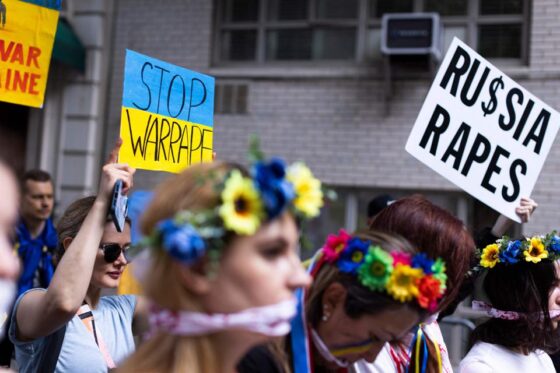
KSA to flex international muscles of its own
WHIA- The Week US
All eyes will be on Jeddah, Saudi Arabia this weekend, as world leaders from the United States, Europe, South America, and Asia descend on the coastal Red Sea port city for a planned peace summit to discuss Ukrainian President Volodymyr Zelenskyy’s proposed 10-point plan to end the ongoing Russian invasion of his country. Speaking on Sunday, Ukrainian official Andriy Yermak confirmed the conclave, calling it a means to “restore lasting and just peace” between Ukraine and Russia, even as fighting between the two nations has intensified in recent days. Unlike a similar conference earlier this summer in Copenhagen, Denmark, the Jeddah summit will be notable not only for who is participating and what is being discussed, but for where it’s taking place to begin with.
Although “Arab nations largely have remained neutral,” in the ongoing Russian-Ukrainian war, “in part over their military and economic ties to Moscow,” Saudi Arabia has slowly begun showing increased involvement in the conflict, including having invited Zelenskyy to address an Arab League summit this past May, Politico reported. “It has kept up close ties with Russia, with which it leads the Opec+ group of oil producers and exporters, but has also sent financial aid to Ukraine,” the Foreign Times added, highlighting the work the kingdom has done to facilitate prisoner swaps between the two countries. So what’s behind Saudi Arabia’s sudden interest in brokering peace between Ukraine and Russia?
What are the commentators saying?
The upcoming summit is “another example of Crown Prince Mohammed bin Salman’s efforts to position himself as a global leader with influence beyond his region,” The New York Times said, adding that it’s not simply about his personal ambitions, but a broader effort to “carve out a role for the kingdom as a mediator” as well. The push comes as Saudi Arabia attempts to shed its reputation as a biased party after the “White House accused it last year of siding with Russia in keeping oil prices high — thus bolstering Moscow’s finances,” the Wall Street Journal reported. Western nations agreed to hold the talks in Saudi Arabia “partly in hopes of persuading China, which has maintained close ties to Moscow, to participate” as well.
“The kingdom has sought to position itself as a middle power with influence beyond its region, while balancing ties with the US, Russia and China,” the Foreign Times agreed. Mediating the upcoming summit would “demonstrate the effectiveness of that approach,” one source added.
Nevertheless, with bin Salman’s personal fortunes so closely tied to those of his country, it’s impossible to fully extricate the two from one another, as “ties remain strained between Riyadh and the West over the 2018 killing and dismemberment of Washington Post columnist Jamal Khashoggi at the Saudi Consulate in Istanbul, which U.S. intelligence agencies assess that Prince Mohammed ordered,” Politico said, pointing out the prince’s alleged efforts to “reach a détente with Iran and push for a peace in the kingdom’s yearslong war in Yemen.”
What could happen next?
At the moment, it’s unclear how many of the 30-some countries that have reportedly been invited to the summit will actually participate. One country that won’t be participating — nor was it invited to in the first place — is Russia itself.
“Russia will keep an eye on this meeting,” Kremlin spokesperson Dmitry Peskov told reporters, according to Russia’s Tass news agency. “We’d have to fully understand what goals are being set and what the organizers actually plan to talk about.”
Among those who have been invited, however, are “senior officials from China, Brazil, South Africa and India” — four of the five BRICS nations (absent Russia) who have recently begun making moves to challenge the U.S. dollar’s global monetary hegemony. That effort, Fortune reported, has been “accelerated” by the various Western sanctions on Russia for Ukraine’s invasion. Ukraine, crucially, has pushed for “a broadening of sanctions on Moscow,” The Wall Street Journal noted, adding that “India, Turkey, Brazil and China have eschewed” the effort. The tension between Ukraine’s peace proposal and the group of developing nations has long been a sticking point at various stages of these negotiations. During the previous meeting in Copenhagen, “the developing-country group made it clear they were open to discussing shared principles but wouldn’t sign onto Ukraine’s plan” outright. Attending the Saudi Arabian summit suggests that those discussions remain ongoing.
Russia, meanwhile, is coming off a massive summit of its own, having just finished hosting representatives from 49 African nations who traveled to Moscow as Putin hopes to assuage their fears that “his war in Ukraine hasn’t compromised the Kremlin’s ability to provide military and political support to the continent.”
Regardless of the outcome of the upcoming Jeddah conference, the fact remains that “The war in Ukraine has been a huge bonanza for the Saudis.” Writing in The Washington Post last month, columnist Josh Rogin laid bare an underlying financial reality in which “Saudi state oil company Aramco made a record $161.1 billion in profit last year, up 47 percent from 2021.”
“Meanwhile,” he pointed out, “Riyadh has given Ukraine a measly $400 million in humanitarian aid.”
